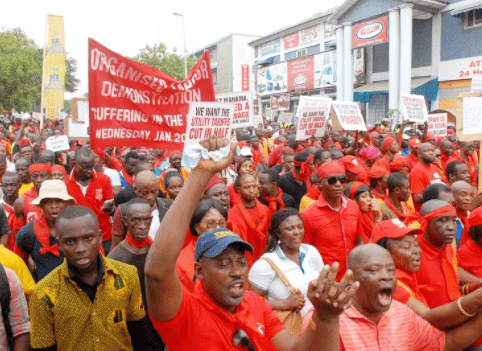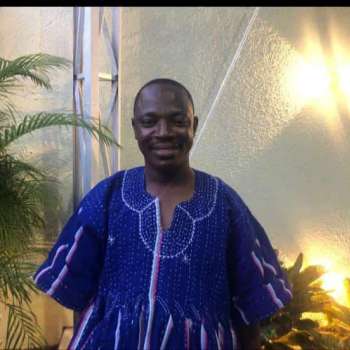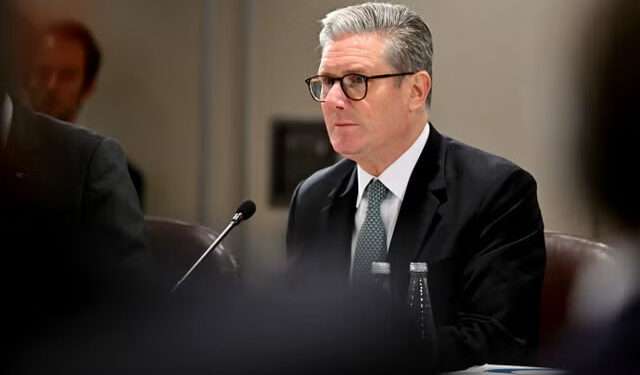Despite the failed strike by organized labor against galamsey, Dr. Zachariah Langnel, a political scientist and analyst, has noted that the mere threat of action from labor unions compelled the government to respond.
He argued that these groups deserve recognition for this, especially given that influential figures like Otumfuo II have unsuccessfully tried to address the illegal mining issue through the destooling of chiefs.
However, Dr. Langnel pointed out that the government’s current strategies are not new; they have been employed for years in the fight against galamsey.
“So from that perspective, we want to give some kind of credit to organized labor. However, we’re expecting labor to push a little bit, but they left the fight along the way. Right? So that is where the problem is.
“And then we, in academia, are well aware that the government tried to use divide-and-rule tactics. So, even before it happened, we saw the [Ghana Medical Association] GMA backing out. There has been some kind of backdoor influence. The government tried to influence people to back down and all of that.”
Dr. Zachariah Langnel
In an interview with Vaultz News, Dr. Langnel highlighted that recent political developments have shaped labor’s actions.
He observed that while the government has attempted to diminish the influence of these groups, labor may have called off the strike, but organizations like the University Teachers Association (UTAG) remain steadfast.
Dr. Langnel also emphasized that others, such as the Media Coalition Against Galamsey, are maintaining their positions, signaling that the struggle is far from over.
He pointed out, however, that these recent developments have revealed internal divisions within labor.
According to Dr. Langnel, while this stance may be surprising to outsiders, those in academia expected it, recognizing that some groups can be easily compromised under pressure.
He further noted that when labor unions in Ghana unite, they can create a formidable collective force to pressure the government.
However, Dr. Langnel indicated that this situation has also shown politicians that certain segments of organized labor are more susceptible to compromise. “These are the people that when you try to deal with them, they can easily give up and so in a way, it’s just good in the long run.”
Failed Strike Undermines Labor’s Unity Against Injustice
Furthermore, Dr. Zachariah Langnel remarked that the failed strike would affect labor’s capacity to unify against societal injustices.
He criticized the fact that while unions stood firm on their own interests, as seen with the SSNIT hotels saga, it’s unclear why they have sidelined others, potentially undermining accountability and weakening their collective voice.

However, Dr. Langnel acknowledged that it is still too early to fully understand the implications of this situation.
“Public perception and public opinion are very important when it comes to promoting accountability and fighting unethical behavior in society. So what it also means is that now that organized labor decided to do this, they have received several criticisms.
“The fact that they cannot be trusted. So what is left in the minds of many Ghanaians is that does it mean that if it is not your own interest, it will not stand firm. It is something that involves our collective future. Why do you want to compromise that one?”
Dr. Zachariah Langnel
The political scientist remarked that if labor chooses to advocate for causes that serve their own interests, the public will develop particular perceptions regarding their motives.
He warned that this could damage their reputation, especially in the fight against corruption and unethical practices in society.
Dr. Langnel stressed the importance of reflection among the leaders of these unions.
He asserted that organized labor should not be seen as a unified or binding force; instead, it is made up of autonomous bodies that collaborate to form this coalition. “So to some extent, it’s just like a coalition government that can disintegrate when something happens.”
The political scientist urged labor leaders to protect not only workers’ interests but also citizens’ collective future.
He stressed the need for union leaders to reflect on national interests and consider how to safeguard them.
Dr. Langnel further posed critical questions for labor: How can they stand up to those in power? How can they pressure the government to implement policies that benefit the wider population instead of serving selfish interests?
He emphasized that organized labor must critically engage with these issues.
Dr. Langnel on Governance in Labor Unions
Dr. Zachariah Langnel underscored the significance of governance structures within labor.
He pointed out that individual organizations often face political influence during leadership elections, with politicians seeking to install their allies in key positions, making these unions more susceptible to compromise.

In contrast, Dr. Langnel pointed out that academia prides itself on its independence and successfully resists such infiltration, while other unions frequently struggle to withstand political pressure.
“But going forward, individual unions need to think about it. They should know the implications of political manipulations…we should have our eyes on the ball. And the ball is our national and collective interest. If you’re able to do that, then we can keep political forces at bay. We’ll be able to neutralize political forces. At the end of the day, we’ll get the accountability and the services that we deserve as citizens.
“They need to prove to us that they are a force that can rally everybody behind them to push through any agenda that will benefit the collective good. But as it stands now, we all need to sit down and rethink how we can build bridges and gain trust. It’s very important. Because as it stands now, nobody trusts anybody.”
Dr. Zachariah Langnel
Dr. Langnel emphasized the urgent need to reform the leadership of organized labor to one that truly prioritizes the collective good.
He noted that failing to do so could result in significant issues, as labor requires leaders who are genuinely committed to the nation’s welfare.
He highlighted that in academia if a UTAG president were to betray its members, they would face prompt consequences.
Dr. Langnel noted that the backlash faced by GMA leadership for its recent actions concerning the strike illustrates that such betrayals are intolerable and can lead to the swift removal of leaders.
He asserted that Ghana lacks strong leadership at all levels, emphasizing that effective leadership is crucial for fostering a positive impact on national governance. “So until we have a change of leadership, all that we are seeing will not be to our benefit.”
Concerns Over Lack of Formal Structure in Labor
Furthermore, Dr. Zachariah Langnel expressed concern over the absence of a formal structure within labor.
He emphasized the importance of establishing clear rules of engagement to ensure that members understand their obligations and cannot easily opt out when it is convenient.

He noted that, for instance, even if an individual union disagrees with the policies of organized labor, members should still adhere to the majority’s decisions.
With these structures in place, Dr. Langnel indicated that labor can develop enduring frameworks that will significantly enhance its effectiveness.
“So if you look at the models for civic activism, a strike is normally used as a last resort. It should be a last resort. After we have done all other engagements, then we try the last resort. But we are living in a particular environment where the only thing our duty bearers understand is strike. Until you say strike, they don’t understand anything.
“Come and let’s discuss…let’s keep on discussing and that doesn’t work. There are many tools available, but depending on the nature of your governance, you have to look at which one is the most potent and which can yield results. However, that tool should not be used habitually, or it loses its relevance.”
Dr. Zachariah Langnel
Dr. Langnel further noted that as the country approaches elections, strikes can serve as an effective means to compel duty-bearers to address demands.
He expressed frustration over the abuse of strikes, pointing out that the recently held catholic prayer walk underscores the significance of peaceful demonstrations.
Rather than resorting to strikes, he suggested organizing a peaceful demonstration.
He pointed out that organized labor could potentially plan a peaceful demonstration to rally support.
Dr. Langnel stated that while it is crucial to consider whether people will trust and participate, starting with demonstrations could be a positive step forward.
He indicated that if necessary, this could lead to escalating to a full-blown strike later on. “But we didn’t start there because we understand that the only language politicians understand is to strike.”
Dr. Langnel argued that while some labor groups may choose one approach, others, like UTAG, could also organize demonstrations.
He indicated that media professionals could wear red armbands to show solidarity and religious organizations could participate in these efforts as well.
According to the political scientist, these actions represent valuable tools for citizens to encourage the government to address their demands concerning illegal mining.




















